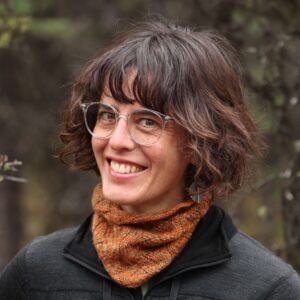
- This event has passed.
Nonfiction Workshop Series [Virtual]
December 11, 2024 @ 7:00 pm - February 12, 2025 @ 8:30 pm

Virtual Nonfiction Workshop Series
With Erica Watson
Dates: December 11, 2024; January 8, 2025; and February 12, 2025
Time: 7:00-8:30pm
Location: virtual (Zoom)
Description: The purpose of this workshop series is to allow participants the opportunity to give and receive feedback on their work in a facilitated space. The series will consist of three separate 90-minute workshop sessions. Participants may register for a single session or for the entire series. This particular workshop series will be limited to nonfiction (eg, nonfiction essays, memoir excerpts, etc.).
Workshops will be limited to five participants, each of whom will submit a piece of writing no more than 10 pages long. Participants will have access to each other’s work via a shared GoogleDrive folder. Each submitted piece will receive 15 minutes of focused feedback. See below for a sample workshop schedule:
- 7:00-7:10: Welcome and updates from facilitator
- 7:10-7:25: first workshop
- 7:25-7:40: second workshop
- 7:40-7:55: third workshop
- 7:55-8:10: fourth workshop
- 8:10-8:25: fifth workshop
- 8:25-8:30: Finish up, announcements/instructions for next time
Workshop Guidelines and Etiquette: Sharing their writing can be a vulnerable experience for many people. The purpose of a workshop is for participants to give and receive constructive feedback in a safe, supportive setting. As such, it’s extremely important that participants agree to treat each other (and their work) with respect and kindness. 49 Writers and the instructor reserve the right to ask anyone who does not observe these rules to leave the workshop without a refund. By signing up for this workshop, participants agree to abide by the following guidelines and rules.
- Upon registering for the workshop, each participant will receive a link to a GoogleFolder to upload their writing sample. In order to give the instructor and fellow participants adequate time to prepare, workshop submissions should be uploaded at least one week in advance of the workshop.
- If submissions are not uploaded at least a week in advance, participants should expect that others may not have time to read their work and the quality of the feedback they receive may not be as good.
- All submissions should be uploaded in a file format that is easily accessible – Word or Google docs are preferred; pdfs are also acceptable.
- Submissions should be kept to 10 pages or less. It is up to participants whether they submit a standalone essay, several flash essays, or an excerpt of a larger work (such as a memoir). If a submission over 10 pages is uploaded, participants should expect that others may not have adequate time to read their work and the quality of feedback they receive may not be as good.
- If your work contains themes or topics that may be difficult for others (for example, sexual assault, abuse, or excessive violence), please include a content warning for other readers.
- Critiques should be specific, constructive, and kind.
- For example: Instead of saying, “This section isn’t working,” you might say, “I think your voice as a narrator gets a little lost here. Perhaps you could give us more sensory details or interiority so that we stay grounded in your perspective throughout the piece.”
- For example: Instead of saying, “This section isn’t working,” you might say, “I think your voice as a narrator gets a little lost here. Perhaps you could give us more sensory details or interiority so that we stay grounded in your perspective throughout the piece.”
- As a workshop participant, remember that your job is not to critique the story itself or question its plausibility, but rather to help the writer tell it in the best way possible.
- If desired, participants are encouraged to leave a note in their submission asking for feedback on a particular aspect of their piece that they want readers to focus on, or requesting that certain aspects of the piece be left alone.
- For example: “I’d really like thoughts here on the amount of background information that I’m giving in this piece, and whether it should be delivered differently. However, the relationship with my ex that is discussed in this piece is a sensitive subject and I’d prefer not to discuss it.”
- For example: “I’d really like thoughts here on the amount of background information that I’m giving in this piece, and whether it should be delivered differently. However, the relationship with my ex that is discussed in this piece is a sensitive subject and I’d prefer not to discuss it.”
- Remember that positive feedback is just as important as critiques. If something is working well, tell the writer so! You can also use a “sandwich method” (where you pair positive feedback and negative together) to help ensure that other writers don’t get too discouraged or overwhelmed by critiques.
- For example: “I really love the lyric language that you use in this section – it’s beautiful and adds a lot of richness to the piece. However, I felt that it slowed down the pace of the story in some places [give specific examples if possible]. Maybe you can tone it down a little in those spots so that you maintain your momentum.”
- For example: “I really love the lyric language that you use in this section – it’s beautiful and adds a lot of richness to the piece. However, I felt that it slowed down the pace of the story in some places [give specific examples if possible]. Maybe you can tone it down a little in those spots so that you maintain your momentum.”
- Many workshops observe a rule that the person receiving feedback is not allowed to talk. While we won’t be strictly enforcing that rule in this workshop (we don’t want anyone to feel silenced), in the interest of time and staying on topic, we suggest that the person who is being workshopped refrain from reacting to the feedback they are receiving except to ask for additional clarity.
- When receiving feedback, try to avoid reacting defensively. Remember that it’s unlikely that every single critique will be actionable for your writing. As a writer, it’s your job to determine which comments are most helpful and leave the rest.
Register to Reserve Your Spot
- Member Price: $40/single session or $110/all three sessions
- Non-Member Price: $50/single session or $150/all three sessions
Scholarships: 49 Writers offers one full scholarship to every class and workshop. To apply, click here.
Refund & Cancellation Policy: If the event or class is cancelled for reasons beyond 49 Writers’s control, all fees will be refunded in full. In the event that an attendee is unable to attend for personal reasons, fees are nonrefundable.
 About the Facilitator: Erica Watson grew up primarily in the Southwestern US, and has lived on the boundary of Denali National Park, on traditional Ahtna lands, since 2010. Her writing centers the intersection of human and nonhuman worlds, community, and climate change. She earned her MFA in creative nonfiction at the University of Alaska Anchorage, where she was a recipient of the Jason Wenger Award for Excellence in Writing. Erica was a 2016 Fishtrap Fellow, and a 2022 Storyknife resident. Her work has most recently appeared in Panorama, AK Humanities Forum Magazine, and Cutthroat Journal. Read more at ericarobinwatson.com.
About the Facilitator: Erica Watson grew up primarily in the Southwestern US, and has lived on the boundary of Denali National Park, on traditional Ahtna lands, since 2010. Her writing centers the intersection of human and nonhuman worlds, community, and climate change. She earned her MFA in creative nonfiction at the University of Alaska Anchorage, where she was a recipient of the Jason Wenger Award for Excellence in Writing. Erica was a 2016 Fishtrap Fellow, and a 2022 Storyknife resident. Her work has most recently appeared in Panorama, AK Humanities Forum Magazine, and Cutthroat Journal. Read more at ericarobinwatson.com.


